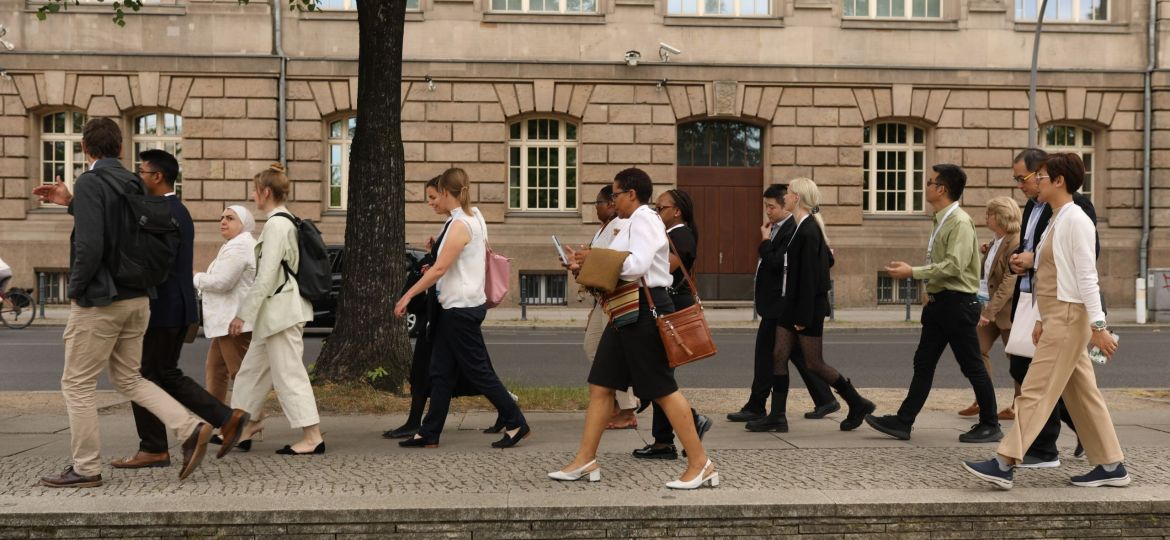
The third and final day of the Global NDC Conference 2023 focused on raising ambition in NDC implementation through innovation and scale. Before the discussions started, the morning offered the participants an opportunity to get acquainted with a fund for sectoral decarbonisation. The Mitigation Action Facility, a grant-based multi-donor fund, which provides technical assistance and climate finance for ambitious and replicable sectoral mitigation projects, invited countries to apply to its current call for projects. The call will assist with the decarbonisation of three priority sectors, namely: energy, mobility and industry to achieve more ambitious National Determined Contributions (NDCs) and Long-Term Strategies (LT-LEDS). “The Mitigation Action Facility is not just a fund, it’s a transformational vehicle” highlighted by Anja Hajduck, State Secretary at the Federal Ministry for Economic Affairs and Climate Action.
Getting to know innovative approaches
Scaling up and replication stood at the centre of the fishbowl conversation in the morning of the third day. First, a panel discussion opened the thematic field of innovative examples of climate actions strengthening NDC implementation and ambition raising. It helped the audience to create a shared understanding of “innovation” and “scale” and discover a wide range of perspectives from different stakeholders and contexts. Four experts from the private sector and global policy discussed how private and public investments can complement each other to create momentum. Further, they showcased some innovative examples of climate actions that strengthen NDC implementation, which are scalable and replicable in other contexts.
Sandrine Kamikazi, Technical Advisor at the Rwanda Green Fund (FONERWA), presented FONERWA as one innovative example. FONERWA is investing in green projects and recently focusing on LT-LEDS in order to catalyse the funding across sectors.
According to Deger Saygin, Industry Programme Lead at OECD Clean Energy Finance and Investment Mobilization (CEFIM), innovative finance instruments, such as blended finance, as well as capacity development, are crucial to create an enabling environment. Another aspect that was mentioned were long-term predictable markets, opportunities for innovative business models and regulatory frameworks facilitate the development of bankable projects.
Christopher Marks, Managing Director and Head of Emerging Markets at Mitsubishi UFJ Financial Group (MUFG) brought up another important aspect: there is not yet enough initiative, but it is important to bring investors into settings they would normally not go to.
Sara Cognuck-González, Consultant for climate and environmental action with international organisations and agencies further pointed out that the preparation and integration of young people can have a large impact on the process of climate policies.
After a lively fishbowl discussion, which was fuelled by questions and remarks from the audience, participants were invited to exchange further during the innovation hubs.
Clearing the stage for concrete innovations
A declared goal of the Global NDC Conference 2023 was to provide participants with methods and innovations to take home with them to raise ambitions in NDC implementation. Therefore, hands-on innovation hubs marked the remaining hours of the third day. Insights and contributions of several initiatives provided valuable examples and guidance on topics as capacity building, digitalisation and data, accelerator labs, energy, finance, stakeholder engagement and inclusion, as well as multi-level climate action. The initiatives were source of inspiration for participants to continue raising ambition through innovation and scale.
A solid basis for optimism: The Global NDC Conference paved the way for making NDC processes more ambitious than ever
After three full packed days, many participants were left with the feeling that knowledge exchange is a good way forward to intensify national NDC processes and reach the climate goals of the international community. The broad variety of contributions during all the different formats of the conference left participants motivated and empowered to act as multiplier and make a difference in their own capacities and in their country context.
In the closing remarks, Philipp Behrens, Head of Division of the International Climate Initiative, Federal Ministry for Economic Affairs and Climate Action gave an optimistic outlook on the success of the conference. “We managed to bring together people from the different sectors and silos, that a couple of years ago would not have been speaking to each other,” he said. Bringing together all those actors, who had something important to say and shared their perspectives made it clear, that we can still turn the rudder around and make a difference.
Stay tuned for our conference report 2023!








